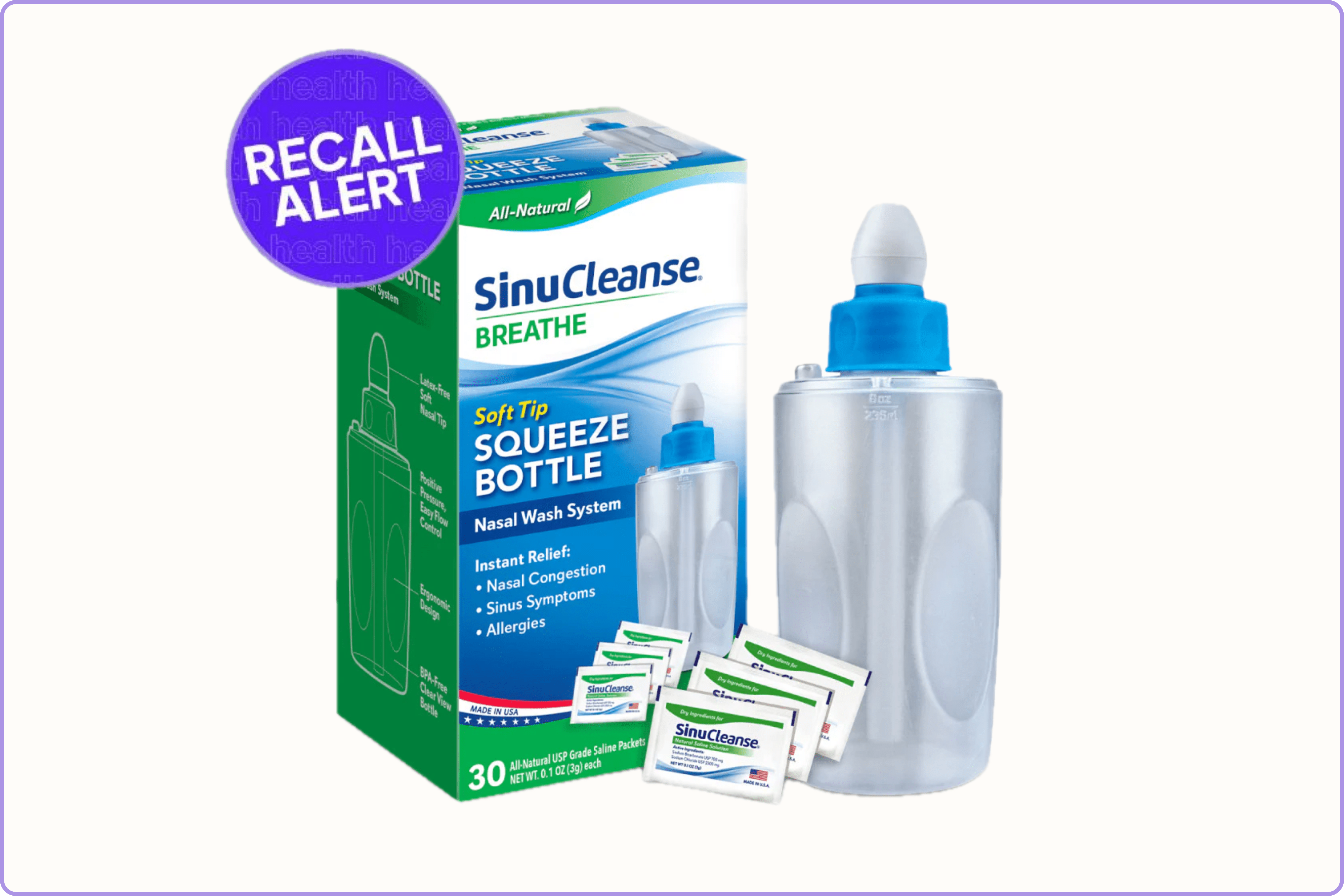Nasal Wash Recalled Nationwide Over Staph Infection Risk

A batch of SinuCleanse nasal wash has been recalled after a test confirmed the presence of Staphylococcus aureus, a bacteria that can cause staph infections

SinuCleanse
- A batch of SinuCleanse nasal wash has been recalled nationwide due to Staphylococcus aureus contamination.
- The bacteria can cause staph infections, which can have serious and potentially life-threatening health effects.
- Consumers should stop using the nasal wash immediately and return or discard it.
The Food and Drug Administration announced on Tuesday that a batch of SinuCleanse nasal wash has been recalled due to contamination with Staphylococcus aureus, a potentially harmful bacteria.
Ascent Consumer Products Inc. voluntarily recalled a lot of SinuCleanse Soft Tip Squeeze Bottle Nasal Wash System after a test confirmed the presence of the bacteria. The pathogen can cause a staph infection, which can be life-threatening.
The company is now urging customers to stop using the nasal wash immediately.
Which Nasal Wash Was Recalled?
The recall only applies to one lot of a SinuCleanse nasal wash with the following information:
- Product Name: SinuCleanse Soft Tip Squeeze Bottle Nasal Wash System
- Lot Number: 024122661A1
- Expiration Date: December 31, 2027
In January, the recalled nasal wash was distributed nationwide to retail and online outlets, such as Walmart and Amazon. The product comes in a boxed carton with a squeeze bottle and 30 Saline Packets.
The recalled SinuCleanse nasal wash treats congestion associated with a sinus infection, cold, flu, or allergies. The product works by flushing out mucus, dust particles, pollen, and other debris in the nasal passage.
Why Was the Nasal Wash Recalled?
The batch of SinuCleanse nasal wash was recalled after a test confirmed it was contaminated with Staphylococcus aureus, or S. aureus.
S. aureus causes the most staph infections of any bacteria in its family. According to the Centers for Disease Control and Prevention, about 30% of people carry the germ in their noses or on their skin. Most of the time, the bacteria is harmless. But if it gets into the body, it can cause serious infections.
Using nasal wash contaminated with S. aureus can allow the bacteria to infect blood, especially when used by people whose nasal passages are inflamed or injured from saline washes. That staph infection can cause secondary infections that are serious and potentially life-threatening, the FDA warned, including:
- Endocarditis, which involves the heart’s inner lining
- Those of the bones and joints
- Splenic abscesses or meningitis
- Bacterial sinusitis, which may lead to eye tissue infections, vision problems, cranial nerve damage, or meningitis
To date, no adverse health events have been reported to Ascent Consumer Products Inc. in connection with the recalled nasal wash.
What To Do If You Have the Recalled Nasal Wash
The FDA is urging consumers to stop using the recalled SinuCleanse nasal wash immediately and return it to where it was purchased, or throw it away.
If you used the nasal wash and experience any issues, the FDA said to contact your healthcare provider. You should also report the event to the FDA's MedWatch Adverse Event Reporting program on their website.
Customers with questions can email Ascent Consumer Products Inc. at cs@ascentconsumerproducts.com from Monday to Friday, 9 a.m. to 5 p.m. EST.
Edited by Health with a background in health, science, and investigative reporting. Previously, she wrote full time about parenting issues for the app Parent Lab. Before that, she worked as a reporter for National Geographic covering wildlife crime and exploitation." tabindex="0" data-inline-tooltip="true"> Jani HallThis story originally appeared on: Health News - Author:Jenna Anderson
















